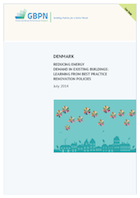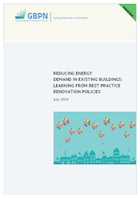从建筑业和房地产业视角看印度实现节能建筑规模化

45 result(s) found
 GBPN开发了一个在线 建筑改造政策工具,它让用户了解一揽子政策的需要及优点并鼓励其采用更积极的策略。
GBPN开发了一个在线 建筑改造政策工具,它让用户了解一揽子政策的需要及优点并鼓励其采用更积极的策略。
 The GBPN has created an on-line Policy Tool for Renovation which allows the user to understand the need for and the benefits of a package of complementary policies to embark on a highly ambitious renovation strategy.
The GBPN has created an on-line Policy Tool for Renovation which allows the user to understand the need for and the benefits of a package of complementary policies to embark on a highly ambitious renovation strategy.
 Report
Report
The GBPN has created an on-line Policy Tool for Renovation which allows the user to understand the need for and the benefits of a package of complementary policies to embark on a highly ambitious renovation strategy.
 Briefing
Briefing
The GBPN has created an on-line Policy Tool for Renovation which allows the user to understand the need for and the benefits of a package of complementary policies to embark on a highly ambitious renovation strategy.
 Highlights
Highlights
The GBPN has created an on-line Policy Tool for Renovation which allows the user to understand the need for and the benefits of a package of complementary policies to embark on a highly ambitious renovation strategy.
Savings in the existing building stock can only be achieved with the widespread adoption and implementation of effective policy packages and support programmes that have a long-term target of achieving deep renovation.
This paper introduces the major state-level regulations and policies for improving energy efficiency in buildings. The purpose of the review is to discuss the challenges and issues in policy implementation and the latest trend in adopting innovative instruments. The implementation of customer efficiency programs increasingly incorporates non-price instruments to encourage participation and deep savings. States pay attention to not only code adoption and update but also compliance and evaluation.
It is clear that city must be part of the solution if an urbanizing world is to grapple successfully with ecological challenges such as energy depletion and climate change. A system dynamics model was developed in this study using STELLA platform to model the energy consumption and CO2 emission trends for the City of Beijing over 2005–2030. Results show that the total energy demand in Beijing is predicted to reach 114.30 million tonnes coal equivalent (Mtce) by 2030, while that value in 2005 is 55.99 Mtce, which is 1.04 times higher than the level in 2005.
This report sets out the positive and negative impacts of improvements in energy efficiency in buildings that could come about through a recast of the Energy Performance Buildings Directive (EPBD). Successive studies have shown that energy efficiency offers many of the most cost-effective options for meeting global emission targets. In many cases, energy efficiency measures have been shown to be ‘negative cost’, meaning that it would be economically advantageous to implement them.
In April 2010 the Tokyo Metropolitan Government launched the Tokyo Cap-and-Trade Program to reduce energy consumption-related CO2 emissions at the city level. This is the world's first cap-and-trade programme to cover buildings in the commercial, industrial and public sectors. Its main aim is to reduce CO2 emissions from energy consumption in existing buildings in urban areas; therefore, it is called an ‘urban cap-and-trade programme’.
In order to achieve long-term targets for energy savings and emission reductions, substantial savings will be needed from existing buildings. For example, a recent analysis for the USA examines aggressive strategies to cut carbon emissions in half by 2040 and finds that in order to achieve this emission reduction target, more than half of existing buildings will need comprehensive energy efficiency retrofits. Germany is targeting an overall primary energy consumption reduction of 50% in 2050 including increasing building renovation rate to 2% per year.
Key messages 1. The Buildings sector of today has an oversized ecological footprint. The buildings sector is the single largest contributor to global greenhouse gas emissions (GHG), with approximately one third of global energy end use taking place within buildings. Furthermore, the construction sector is responsible for more than a third of global resource consumption, including 12 per cent of all fresh water use and significantly contributes to the generation of solid waste, estimated at 40 per cent of the total volume.
There is increasing interest in the idea that energy efficiency has economic, environmental and social impacts beyond energy and cost saving - a ‘multiple benefits’ perspective. However, present EU-decision making on energy efficiency is based on assessment of a very narrow range of costs and benefits. This paper investigates whether and how advocates of energy efficiency have used multiple benefits to frame their interactions with policy-makers at EU and UK level, and to broaden the appeal of energy efficiency.
This article advances a conceptual view of the role of local government in global environmental governance ('GEG') and the system of transnational environmental law ('TEL'). The underlying hypothesis is that a deeper understanding of the role of local governments (global cities and smaller local authorities) is expedient as it has the potential to curb some recurring GEG failures and contribute towards improvements in the pursuit of the objectives of TEL.
Building energy efficiency is an important strategy for reducing greenhouse gas emissions globally. In fact, 55 countries have included building energy efficiency in their Nationally Determined Contributions (NDCs) under the Paris Agreement. This research uses building energy code implementation in six cities across different continents as case studies to assess what it may take for countries to implement the ambitions of their energy efficiency goals.
Energy efficiency (i.e., the ratio of output of performance to input of energy) in office buildings can reduce energy costs and CO2 emissions, but there are barriers to widespread adoption of energy efficient solutions in offices because they are often perceived as a potential threat to perceived comfort, well-being, and performance of office users. However, the links between offices' energy efficiency and users' performance and well-being through their moderators are neither necessary nor empirically confirmed.
Energy efficiency policies have the unique capacity to contribute to a more sustainable energy future at an economic net benefit even when co-benefits are not included in the evaluations. The purpose of this paper is to present quantitative and comparative information on the societal cost-effectiveness and the lifetime energy savings of all light eight building energy efficiency policy instruments.
Nowadays, energy efficiency (EE) is presented as a reliable strategy towards sustainable development, but its application has not been developed equitably worldwide, since most EE policies have been implemented in industrialised nations, and developing countries are still in the process of improving their EE levels.